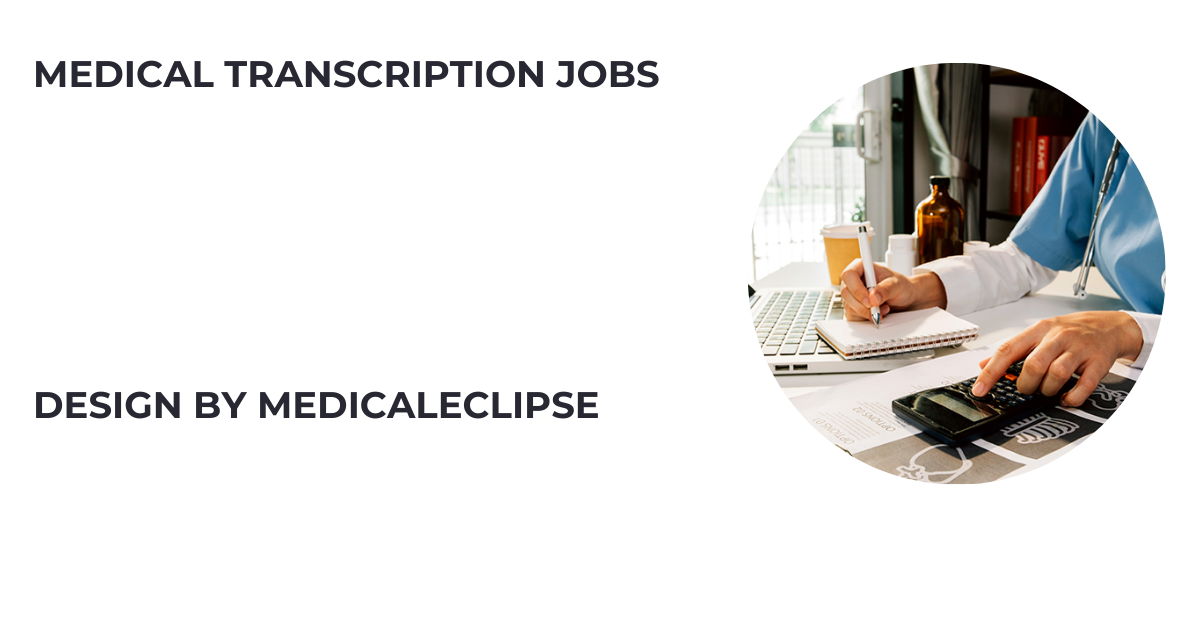Medical transcription jobs involve transcribing voice-recorded medical reports into written text. These roles require skills in typing, medical terminology, and attention to detail.
In this article, we’ll cover everything you need to know about medical transcription jobs, including what they involve, the skills needed, and how to get started.
What is Medical Transcription?

Medical transcription is the process of converting voice-recorded medical reports, dictated by physicians and other healthcare professionals, into written text. These documents include patient histories, physical exam reports, medical procedures, diagnoses, and treatment plans. Medical transcriptionists play a vital role in ensuring that patient records are accurate, clear, and up-to-date, which is essential for high-quality patient care.
Types of Medical Transcription Jobs:
There are several types of medical transcription jobs available, depending on your preferences and qualifications. Here are the most common options:
In-House Medical Transcriptionist:
An in-house medical transcriptionist works directly for a healthcare facility, such as a hospital or clinic. This role involves transcribing medical reports dictated by doctors and other healthcare professionals within the facility. You may be required to work in an office setting, interacting with other medical staff.
Freelance Medical Transcriptionist:
Freelance transcriptionists work independently and often from home. They take on clients, typically doctors, hospitals, or transcription service companies, and complete the transcription work on a contractual basis. Freelance work offers flexibility, but it also requires self-discipline and good time management skills.
Medical Transcription Editor:
A medical transcription editor reviews and edits the work of other transcriptionists to ensure accuracy, grammar, and medical terminology are correct. Editors typically work from home or in medical facilities, ensuring that all documents meet the required standards.
Remote Medical Transcriptionist:
With advancements in technology, many medical transcriptionists work remotely. This is similar to freelance work but typically involves a more structured arrangement with a transcription service company or healthcare provider. Remote transcription jobs offer flexibility, allowing workers to set their own hours and work from anywhere.
Also Read: Jobs That Are In The Medical Technician Field – Medical Technician Jobs!
Skills Required for Medical Transcription Jobs:
Medical transcriptionists need a combination of technical, language, and healthcare knowledge. Here are some essential skills for this profession:
Typing Speed and Accuracy:
Medical transcriptionists must have fast and accurate typing skills to keep up with the audio recordings. Typically, transcriptionists are expected to type at least 60 words per minute with high accuracy.
Knowledge of Medical Terminology:
A solid understanding of medical terminology is critical for transcribing reports correctly. Familiarity with medical procedures, medications, anatomy, and healthcare laws ensures that transcriptionists can accurately interpret and transcribe the audio files.
Attention to Detail:
Medical transcription requires keen attention to detail, as mistakes in patient records can have serious consequences. Transcriptionists must ensure all information is accurate, consistent, and clear.
Listening and Comprehension Skills:
Transcriptionists must be able to listen carefully to audio recordings, often with various accents and speaking speeds. They must also be able to comprehend complex medical language and dictation.
Computer and Technology Skills:
Medical transcriptionists use specialized software for transcribing, editing, and managing medical files. Basic computer knowledge, including the ability to use word processors, transcription software, and medical record systems, is essential.
How to Get Started in Medical Transcription?

Starting a career in medical transcription involves a few key steps. Here’s how you can get started:
Get Proper Training:
While some transcriptionists may learn on the job, most employers prefer candidates who have completed formal training. Many colleges, online programs, and vocational schools offer certification and degree programs in medical transcription. These programs teach you medical terminology, typing skills, and the basics of transcription.
Obtain Certification:
While not always required, certification can increase your job prospects and earning potential. The American Health Information Management Association (AHIMA) and the Association for Healthcare Documentation Integrity (AHDI) offer certifications for medical transcriptionists. Certifications show potential employers that you have the necessary skills and knowledge to handle medical transcription work.
Gain Experience:
Like most professions, gaining experience is crucial. Start by working on practice transcription tasks or applying for entry-level jobs. As you gain experience, you’ll become more proficient in transcribing and familiar with various medical specialties.
Choose Your Work Environment:
Decide whether you want to work in-house, freelance, or remotely. Each option has its benefits, but remote and freelance jobs often provide more flexibility and work-life balance.
Stay Updated:
The medical field is always evolving, and so is medical transcription. Stay updated on new technologies, software, and medical terms to ensure your skills remain relevant. Continuous learning through courses and seminars can help improve your career prospects.
Also Read: What Is My Medical Record Number Sharp Rees Stealy – Accessing Your MRN at Sharp Rees-Stealy!
Benefits of a Career in Medical Transcription:
There are several advantages to working in medical transcription:
- Flexibility
Many medical transcription jobs, especially freelance and remote positions, offer the flexibility to work from home and set your own schedule. - Job Security
As healthcare continues to grow, the demand for medical transcriptionists is expected to remain strong. The need for accurate medical documentation ensures a steady demand for skilled transcriptionists. - Competitive Salary
Medical transcriptionists can earn a competitive salary, with experienced professionals earning a higher rate. Pay varies based on experience, specialization, and the type of work environment. - Career Advancement
Experienced transcriptionists can take on editing roles, specialize in certain medical fields (like radiology or cardiology), or even start their own transcription services.
FAQ’s
1.What is a medical transcription job?
A medical transcription job involves converting audio recordings of medical reports into written documents.
2.What skills are required for medical transcription jobs?
Key skills include typing speed, accuracy, medical terminology knowledge, attention to detail, and listening comprehension.
3.Do I need certification for medical transcription?
Certification is not mandatory but can improve job prospects and earning potential.
4.Can I work from home as a medical transcriptionist?
Yes, many medical transcription jobs, especially freelance and remote roles, allow you to work from home.
5.What are the benefits of a medical transcription career?
Benefits include job flexibility, career advancement opportunities, competitive pay, and strong job security.
Conclusion
Medical transcription jobs offer a unique blend of healthcare and language skills, providing a rewarding career for individuals who enjoy working with medical terminology and technology. Whether you’re looking for flexibility through freelance work or prefer the stability of an in-house position, medical transcription offers numerous opportunities. With the right training, skills, and certification, you can embark on a successful career that contributes to the efficient and accurate documentation of patient care.

Leave a Reply